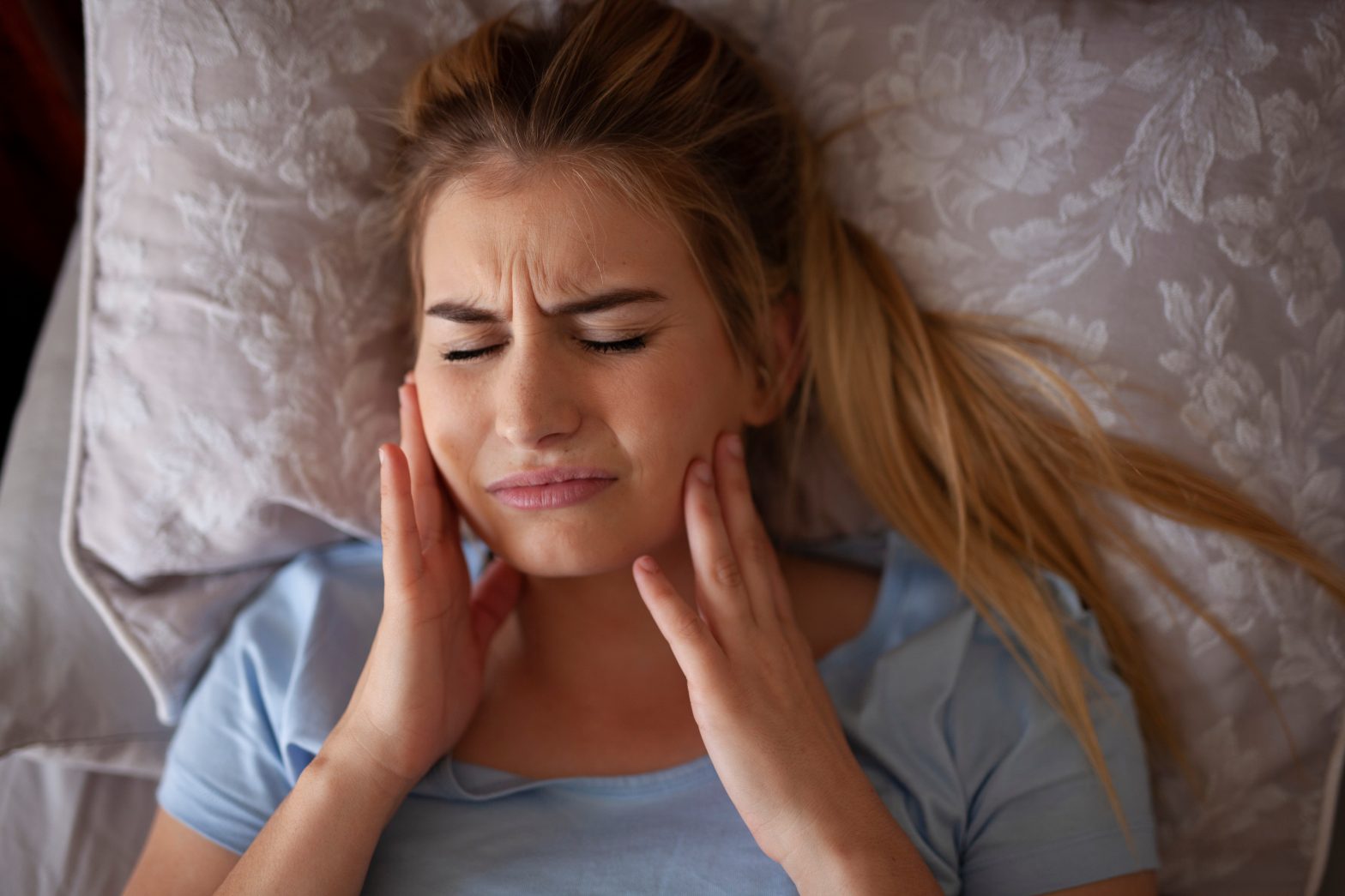How to Relieve TMJ Pain at Night

Do you ever struggle with constant headaches, neck, shoulder, or mouth pain? It might be coming from your TMJ (temporomandibular joint). Fortunately, TMJ treatment is straightforward with the help of our Carlsbad dentist.
How to Relieve TMJ Pain at Night (or Day)
One of the most common causes of TMJ pain is bruxism, which is chronic teeth clenching and grinding. All of the excess tension in your TMJ can radiate through your joint and surrounding tissues, causing painful aches and migraines. Some people even have earaches because of it.
Bruxism is often a subconscious habit. We clench and grind our teeth when we’re sleeping or stressed. The best way to treat it is by wearing a nightguard.
How does a night guard help TMJ sufferers? By placing a durable yet gentle buffer between your upper and lower teeth. When you sleep in a bruxism mouthguard, it prevents your TMJ from fully engaging. In turn, the muscles around it cannot completely contract, so they’re forced to relax.
Not only does the night guard help relieve joint tension, but it also prevents unnecessary tooth wear and broken dental restorations. When your TMJ can relax, you get to wake up without any painful headaches, joint stiffness, or sore teeth.
If you’re someone who tends to clench and grind their teeth during the daytime, Dr. DeAngelis might recommend a more discreet bite splint that you can wear to work.
Why are Custom Mouth Guards Better?
Professionally-fitted acrylic bruxism appliances work far better than anything you can buy online or in a store. These mouthguards are made to fit your unique smile, hugging each tooth so that it feels comfortable and doesn’t fall out of your mouth while you’re sleeping.
On the other hand, commercial mouthguards are often bulky and uncomfortable. Many people find that they take them out while they’re sleeping without even realizing it. The cumbersome fit also makes them difficult to sleep in at all.
TMJ Pain Home Remedies
Aside from wearing a nightguard to prevent your TMJ from fully engaging, there are simple steps you can take at home to help with discomfort, including:
- Taking an over-the-counter anti-inflammatory as directed, such as Motrin or ibuprofen
- Applying a warm, moist compress to the side of your jaw for up to 20 minutes at a time
- Massage
- Relaxation and meditation
- Exercise
- Avoiding hard or firm foods
Do I Have TMJ Disorder?
TMJ pain is often a symptom of TMJ disorder (TMD, TMJD), although not everyone with joint pain has an actual joint disorder. By correcting symptoms early enough, it’s possible to relieve discomfort and prevent frequent headaches.
Clinical TMJ disorder will usually include other symptoms, like limited range of motion, joint popping and clicking, joint dislocation, and deterioration of the joint tissues.
How are Bruxism Mouthguards for TMJ Made?
To fit you with a TMJ appliance, we’ll have you stop by our Carlsbad dentist’s office for a short visit. We’ll take an impression of your teeth, then use that mold to pour a replica model of your mouth. Then we’ll melt a thick piece of acrylic or other durable BPA-free material over the teeth and trim the edges for a smooth contour. About a week or two later, you can come back to our office to try in your appliance.
Most TMJ mouthguards last for several years when you wear them nightly. Just remember, it’s natural for your teeth to slowly wear through them. When they do, you’ll want to have your prosthesis updated with a newer version.
TMJ Treatment Carlsbad
DeAngelis Family Dentistry can help you find a way to treat your TMJ pain at night (or during the day) with a quick call to our office in Carlsbad. Dr. DeAngelis will evaluate your jaw and take a full-mouth X-ray to assess the joints on both sides of your face. Depending on your range of motion and how your teeth look, we might recommend a bruxism mouthguard.
Contact our office today for more information.






